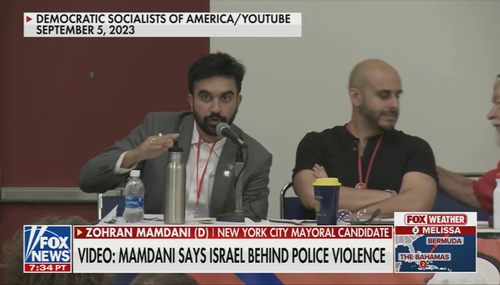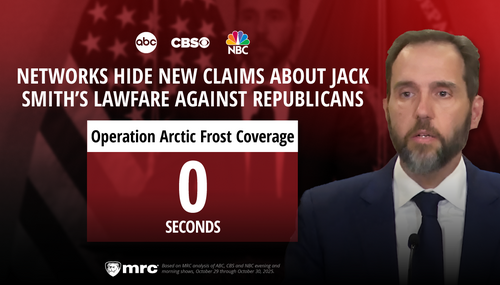On Wednesday’s Joy Behar Show on HLN, Kentucky Republican Senate nominee Dr. Rand Paul appeared as a guest, and, after host Behar brought up examples of people with racist messages who have shown up at some Tea Party events whom the mainstream media have been fond of highlighting as if they were representative of the movement, Dr. Paul recounted that he had never seen such activity at Tea Party events he has attended, and charged that the media are "captivated" by "outlandish behavior"rather than the mainstream message of the movement:
JOY BEHAR: Right, but does it bother you at all, Rand, about seeing those kind of racist images that we`re all seeing that are connected to these Tea Party events?
RAND PAUL: Well, it`s interesting, you know, I`ve seen them on the national media, but I haven`t seen them at any of the rallies I`ve gone to. I`ve probably been to 50, 60 Tea Parties. I`ve been to interview with their inner circle, with their committees. I`ve not met anyone who's racist in the movement. I think when you gather 100,000 people together, there will be a few outliers, and it`s like anything else, I think the media seems to be captivated more by the outlandish behavior as opposed to the 99 percent there that are people who just believe in limited government or believe that deficits are bad.
After Behar did not seem to accept his answer and started to change the subject to Dick Cheney, the exchange continued:
BEHAR: Let me quote Dick Cheney.
PAUL: It doesn`t sound like I convinced you.
BEHAR: Well, because I think that the Tea Partiers such as yourself and the good people in the Tea Party need to really get those people out and prohibit them from any kind of voice in the party because it`s getting a bad name. And lot of the things you say are very appealing to all Americans, and yet it`s alienating to people like me to see that.
Behar took a couple of shots at Cheney during the segment, most notably as she asked Paul about his disagreement with the Bush administration on the war in Iraq when she contended that Cheney "likes to start" wars:
I`m familiar with your father, your father`s positions, too. I thought that a lot of what he said in the primaries made a lot of sense to a lot of different people, but let me read you something that Dick Cheney said, and he endorsed your opponent. He said, "We need Senators who truly understand radical Islam and al-Qaeda and who will work to strengthen our commitment to a strong national defense and to whom this is not just a political game." He`s sort of implying that you, because you believe in small government maybe and you`re not interested in the wars that he likes to start will not be able to handle the military issues that confront America. How do you respond to that?
Below is a complete transcript of the interview from the Wednesday, May 19, Joy Behar Show on HLN:
JOY BEHAR: Tea Party candidate Rand Paul won the GOP senate primary race in Kentucky last night, either in spite of or because Dick Cheney endorsed his opponent. We`re not sure.
DR. RAND PAUL, KENTUCKY REPUBLICAN SENATE NOMINEE: I have a message, a message from the Tea Party, a message that is loud and clear and does not mince words: We`ve come to take our government back.
BEHAR: Paul knocked out GOP establishment-favored Trey Grayson. With me now is Dr. Rand Paul. Hi, congratulations on your win last night, Dr. Paul.
PAUL: Thank you, thank you. Glad to be with you.
BEHAR: Okay, you say you want to take the government back. From whom do you want to take it back?
PAUL: That`s a good question. I say from the special interests that seem to use government like it`s their own personal ATM. I also get annoyed by politicians that come to my state with big oversized checks with their name emblazoned upon them as if it`s their money, you know, that they’re giving, and they name parks after themselves, they name roads after themselves. For goodness sakes, it`s our money. It`s not their money, and I think they’re doing a disservice by spending a lot more money than they’re actually receiving, and I think the deficit ultimately leads to grave problems for countries.
BEHAR: So you don`t, you`re not talking really about the Obama administration then. Who are you, I don`t get that. You`re not talking about that.
PAUL: I`m talking about, yeah, I`m talking about overblown government and deficits, but, you know, what I tell people is we doubled the deficit under Republican control, but now we`re tripling the deficit, so it`s, to me and to the Tea Party, if you go to any of these things, it really is about bipartisan blame over the deficit. We`re unhappy a lot of times with the spending from both parties, not just from the current administration.
BEHAR: So I see that. That`s true. Do you identify with the Tea Party or the GOP then? Where are you?
PAUL: Well, it`s interesting, you know, I went to the 1976 Republican convention, and so I`ve been a Republican my whole life. But I tell people, you know, Jefferson talked about that every generation must renew its defense of liberty. I think also every generation must redefine and define what their political parties mean. I mean, look, the Republican Party in 1920 got 90 percent of the African-American vote. Not anymore, so something happened. People either changed or the parties change. And so every generation we get to redefine what the party is, and that`s what a little bit of this Tea Party is. It`s a struggle for defining what the Republican Party means.
BEHAR: Right, but does it bother you at all, Rand, about seeing those kind of racist images that we`re all seeing that are connected to these Tea Party events?
PAUL: Well, it`s interesting, you know, I`ve seen them on the national media, but I haven`t seen them at any of the rallies I`ve gone to. I`ve probably been to 50, 60 Tea Parties. I`ve been to interview with their inner circle, with their committees. I`ve not met anyone who’s racist in the movement. I think when you gather 100,000 people together, there will be a few outliers, and it`s like anything else, I think the media seems to be captivated more by the outlandish behavior as opposed to the 99 percent there that are people who just believe in limited government or believe that deficits are bad.
BEHAR: Let me quote Dick Cheney.
PAUL: It doesn`t sound like I convinced you.
BEHAR: Well, because I think that the Tea Partiers such as yourself and the good people in the Tea Party need to really get those people out and prohibit them from any kind of voice in the party because it`s getting a bad name. And lot of the things you say are very appealing to all Americans, and yet it`s alienating to people like me to see that.
PAUL: Yeah, and I think the reason for it also is the Tea Party has kind of been open mike night. Everybody shows up and voices their grievances, and so some are overblown and overwrought, but what I hope is by my victory I get to help to define what the Tea Party becomes. To me its term limits, which I think have universal appeal, Democrat, Republican, independent.
BEHAR: Yeah.
PAUL: To me it`s also making them balance the budget. I think as a class of people Congress is just untrustworthy with a few exceptions, and that they need to be forced to balance the budget by law.
BEHAR: Right.
PAUL: So it`s really about reform. I think they should read the bills. I think there should be a waiting period before they pass any bills. I think that when they pass bills, they should apply them to themselves. I think the Tea Party is unhappy about a certain arrogance in Washington that says, "You know what, we`ll pass Social Security taxes on everybody else, but then we`ll set up our own pension plan that`s a little better than everybody else`s."
BEHAR: Okay, I`m familiar with your father, your father`s positions, too. I thought that a lot of what he said in the primaries made a lot of sense to a lot of different people, but let me read you something that Dick Cheney said, and he endorsed your opponent. He said, "We need Senators who truly understand radical Islam and al-Qaeda and who will work to strengthen our commitment to a strong national defense and to whom this is not just a political game." He`s sort of implying that you, because you believe in small government maybe and you`re not interested in the wars that he likes to start will not be able to handle the military issues that confront America. How do you respond to that?
PAUL: Well, the interesting thing is he also said deficits don`t matter, and so I`m not sure he would win a lot of votes in the Tea Party right now, so we do think that deficits do matter. I also think that the number one priority of the federal government is national defense, but you have to define what that means. You have to have a good and long debate over what is national security, when is it threatened. And when we go to war, I think we go to war by declaring war not willy nilly with some sort of use of force resolution that people debate and say it meant one thing or another thing. We haven`t declared war since World War II. I think when you go to war, we should declare war formally, and it should be the most important vote that any Congressman or senator ever takes. And if I ever have to make that vote, I vote on it based on my three sons going to war or myself going to war.
BEHAR: Well, thank you very much, Rand, and good luck in the election that you`ll be running in, okay.
PAUL: Thanks, Joy.
BEHAR: And say hello to your father.




